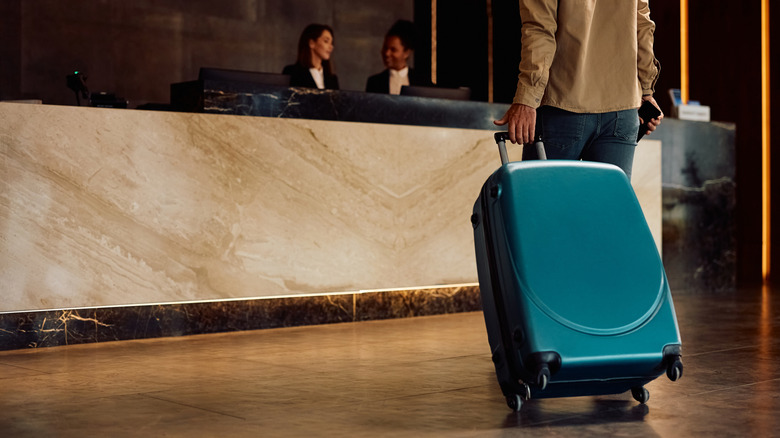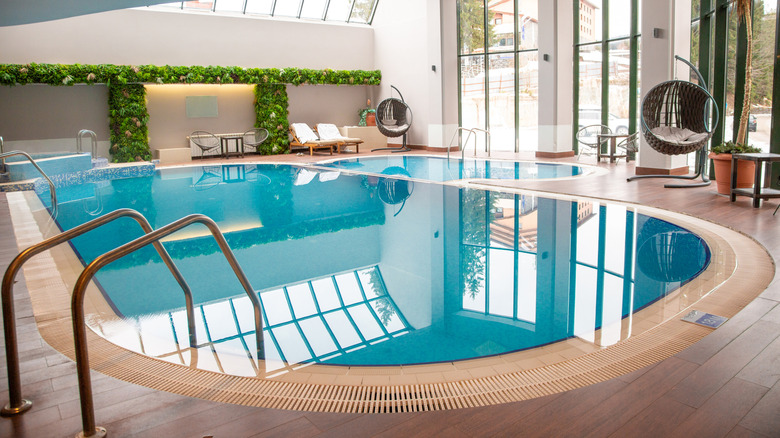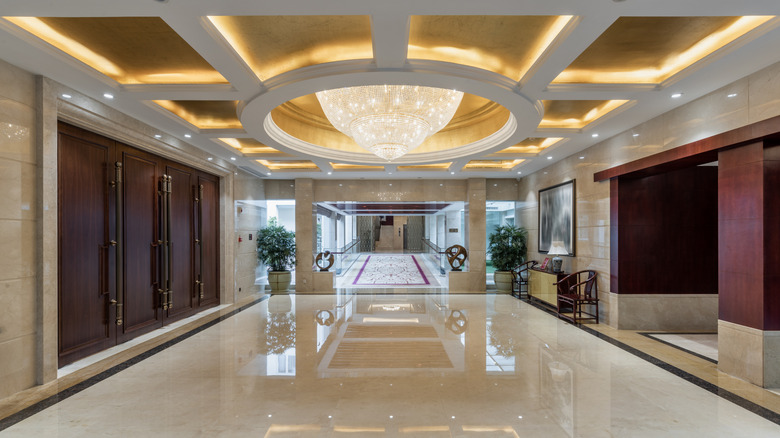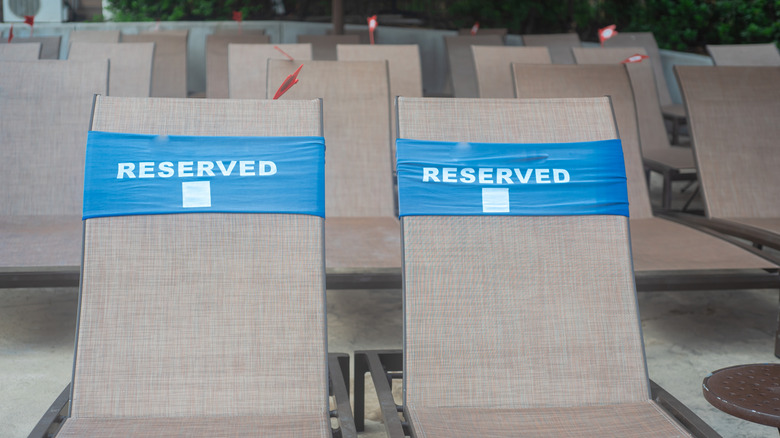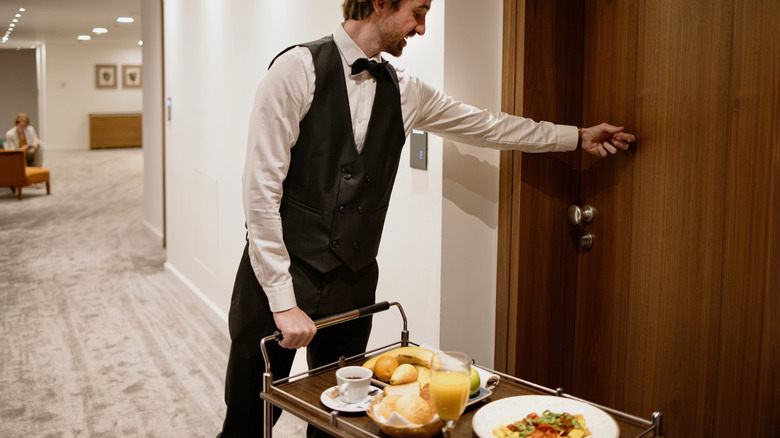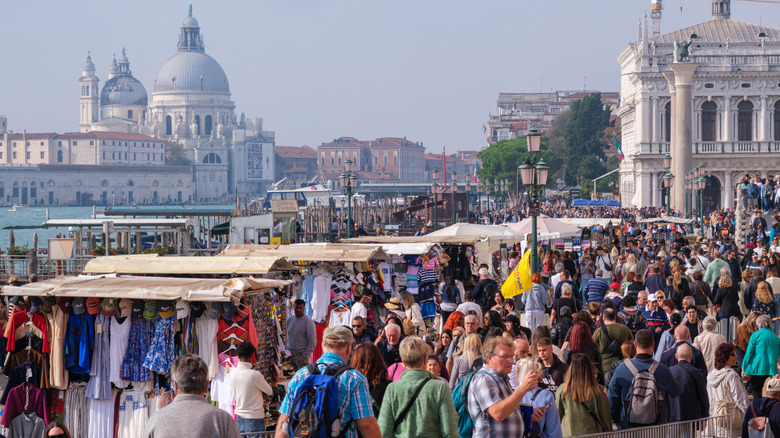10 Extra Hotel Fees Guests Should Be Aware Of Before Booking Their Room
We've all been there. After hours of researching, scrolling through endless reviews, and comparing all the hotel options for your trip — carefully weighing the budget find against the waterfront splurge — you finally find a nightly rate that works for you. You select your dates, pick your room, and suddenly that nightly rate has a sneaky resort fee added on top of it, or maybe it's revealed that the cheaper price does not include the cost of breakfast — and those are just the fees you'll know about when you book. You might be in for more unpleasant surprises when you arrive.
One of the biggest joys while traveling is staying at a dreamy hotel or resort with the perfect aesthetic, location, and amenities. However, having to pay unexpected fees can absolutely put a damper on the stay. You can't avoid every charge, but you can anticipate and estimate costs by knowing the most common fees hotels tack on. This will also help you plan your trip, so you can make key decisions about car rental, meals, and arrival times. Here are all the extra fees hotel guests should look out for before confirming their stay — and also check for on their bill when they check out.
Resort fees
You don't have to stay at a sprawling property on a beach to be hit with the dreaded resort fees — they can strike at any hotel when you least expect it. Resort fees are defined as additional charges added to the nightly room rate to cover hotel services. They may sometimes appear on your bill as "destination fees" or "facility fees." Ostensibly, they're meant to cover the general operating and maintenance costs of complimentary hotel amenities like swimming pools and gyms, regardless or not of whether you use them. Yes, that means even if you spent one night at a hotel — checking in late and checking out early for a stay of less than 24 hours — you'll still be charged the day's worth of resort fees. It is totally unfair.
It's almost impossible to opt out of paying resort fees unless you happen to have elite status with the hotel brand — or can persuade an employee to waive them. Resort fees are usually relative to the nightly rate of your hotel, and according to data compiled by NerdWallet, brands like Hilton and IHG, on average, charge resort fees that are between 3 and 5% of the total nightly rate. In my experience, sometimes hotels will explain to you exactly what your resort fees include, which could even be the cost of daily bottled water or a welcome gift.
Parking fees
Before you start packing for your next long road trip, make sure your hotel has complimentary parking. If you plan on relying on a car for your travels, "free parking" is the first filter you should turn on; otherwise, you might have to pay a fee to keep your car parked overnight on the hotel premises. Hotels in less crowded areas usually include free parking, but it's harder to find in major cities like New York or Los Angeles, where you could pay up to $70 for an SUV at some hotels. When weighing the cost of a car against relying on taxis, public transportation, or ride share services like Uber and Lyft, hotel parking fees should be considered in the count. If you have an electric car, you might even have to pay more to use the hotel's charging stations.
If you do have a car and want to use the hotel parking lot, be aware. Some hotels have valet service, and attendants will offer to park your car for you when you pull up, but before you accept, make sure to confirm whether or not this comes at an extra charge. Don't forget, you'll also be expected to tip.
Early check-in and late check-out fees
After a long day of travel, there's no better feeling than finally arriving at your hotel and relaxing. But if you're arriving early in the morning on a red-eye flight, you might have to wait until the afternoon to check in, which can seem like ages when you're exhausted from a long-haul flight or in desperate need of a shower. Of course, hotels need to clean the rooms between guests, but super early and late check-in and checkout times can be a huge red flag. If you're lucky, you may find that your room is ready before the typical check-in time, and you'll be free to enjoy it on the early side, but sometimes hotels may charge you for the privilege of an early check-in.
When you book your hotel, you may be given an option to tell the hotel what time you plan on arriving, but this can backfire if the hotel sees this as an early check-in request, as one user on Reddit posted: "On the final check-out page, I included that my estimated arrival time was 3-4 PM...And I just got a message from them saying, 'Thanks for reaching out. You can check in at 15:00 – 16:00 for 50 USD.' "
Many guests also request late checkouts, and if you have status with a particular brand, this may be included at no charge. Some hotels may also let you check in earlier if your room is ready — usually during the off-season or if the hotel is not crowded. The price of late checkout or early check-in ranges from brand to brand, so make sure to ask before confirming your stay.
Wi-Fi
In today's world, it's hard to imagine a hotel without Wi-Fi. Maybe if you're traveling to the world's most remote inhabited island or a hotel that's purposefully off the grid, you'd be somewhat expecting it, but for anywhere else, it's essentially a given. When hotels first began offering Wi-Fi, it was seen as a luxury amenity, and so it cost an extra fee. Luckily, that has changed today, with most hotels offering free Wi-Fi. While some hotels might still charge a Wi-Fi fee, what you really have to be careful of is internet speed. Free internet often uses slower speeds, with hotels sometimes charging for faster speeds.
Often, whether or not you can get on the fastest Wi-Fi for free comes down to whether or not you are a member of the brand's hotel loyalty program, such as at Hilton Honors. Thankfully, this usually just means signing up for an account. You often don't need to earn a certain status to get the Wi-Fi perk. If you want faster Wi-Fi or want to add a ton of additional devices, you may incur an additional charge. Checking for Wi-Fi charges is something you can filter for when searching for hotels on online booking websites.
Minibar charges
Hotel minibars are often stocked with all kinds of goodies, from local chocolates to premium wine and spirits, and even your basic chip and soda brands, but they are almost always overpriced. Not to mention, you can find many of these items if you just go for a walk to the nearest convenience store. Some hotels do have complimentary minibars, but make sure you confirm these before taking anything. Other hotels use automatic minibars with sensors that can pick up whenever an item has been removed, so play it safe and don't go rifling around in the fridge if you don't intend to buy anything.
When it's time to check out, go over your bill at the front desk and double-check to see if there are any mistaken charges. It will be easier to dispute them in person, but you can also do it over the phone if you don't happen to notice until later. The hotel should have a record of exactly which items were taken, and you can review the bill line by line.
Pool chairs
If you're paying resort fees, that includes the pool, right? You'd think that would also cover the lounge chairs and umbrellas by the water — but lately, that's not always the case. While it's quite normal to be charged an extra fee if you want to use one of the private cabanas or daybeds, some hotels are now charging extra just for normal lounge chairs. The Bellagio Las Vegas made national headlines when word got out of its $200 charge for a poolside chair, and it wasn't alone, with the Wall Street Journal calling out other hotels charging between $75 and $150 for a lounge chair. These so-called premium chairs are typically closer to the pool, usually in the front row. You can still grab a complimentary chair farther back — although, if you're already paying resort fees, is it really free?
Some hotels argue that a reservation system prevents the chaos of guests running down to the pool first thing in the morning to save the best chairs. However, this also means the front row remains empty while guests avoid paying exorbitant fees for squeezing in a little time by the pool. If you plan to spend the majority of your vacation by the pool and prefer a front-row chair, make sure to check your resort's website (or call up) to check for any fees that might be associated with the premium poolside area.
Spa access
Many hotels advertise themselves as "Resort & Spa," which means that there is a part of the hotel specifically dedicated to wellness treatments like massages and facials — although this always comes at an extra cost. Some hotel spas are very small and may only have treatment rooms, which you'll only get into if you book a session. However, others incorporate features like saunas, steam rooms, and hydrotherapy pools. Whether or not you have complimentary access to these amenities, though, depends on the hotel.
Personally, I love a good soak and any opportunity to ease my travel-weary muscles, so I'm always keen to see the spa when I can. I've stayed in luxury hotels, where the steam room and sauna were incorporated into the pool area and were free for all guests to use, as well as more mid-range hotels, where there was a small fee of about $10 for an hour in the hydrotherapy area. Often, the spa areas are not so large, so hotels ask that you reserve your time in advance to avoid overcrowding. Sometimes, the hotel offers a spa with some extra features like a private pool, but you'll need to book a treatment to get access to it, and you will have limited time to enjoy it before or after your session.
Room service fees
Nothing says "vacation" quite like ordering breakfast in bed. For some people, ordering room service is their favorite part about staying in hotels, but don't be surprised when a service fee pops up on the bill alongside your omelet and coffee. Not to mention, items on a room service menu tend to cost more than what you'd find outside the hotel, i.e., a $40 club sandwich. Room service — especially when it's offered 24/7 — is expensive because the hotel always has to keep somebody on staff to receive, prepare, and deliver your order. Unlike restaurants, hotels never know when — or how often — guests will order, so there's a lot that goes into ensuring your pancakes arrive fresh, hot, and fast.
Check your bill to see if a service fee has been added. If not, you may be expected to tip depending on the local tipping customs. For example, tipping is customary in the U.S., Canada, and the Caribbean but not expected in the U.K. and Australia. If you'd rather skip the service charge or tip, head downstairs to the hotel restaurant — or eat out in your destination. If you know where to look, you can always find great restaurants even in the most underrated foodie destinations.
Breakfast
Some travelers love the luxury of a hotel breakfast. For business travelers, hotel breakfasts save precious time before rushing off to work — and they can be lifesavers for families staying at resorts who need to kickstart their day. A breakfast buffet — especially if there's a waffle maker — can be a real treat, but it's not always included in the rate. This can actually be good news if you don't have much of an appetite in the morning, anyway.
Hotels sometimes advertise their cheapest rates without breakfast included, so it's important to double-check when you're booking. If you're counting on breakfast, you might be in for a surprise charge when you arrive at the hotel, but there are benefits to not booking in advance. For example, maybe you only want breakfast on certain days of your stay, or you only need a croissant and coffee to get going in the morning — that's certainly not worth paying upwards of $30 for. With independent hotels, you will have to check the breakfast policy, but with many larger hotel chains, free breakfast is more likely to be guaranteed.
Tourism or city taxes
In destinations where overtourism is a big problem, you may have to pay extra fees when you check into your hotel. Tourism taxes, also sometimes referred to as city taxes, are local fees that are passed onto the travelers via hotels. Their purpose is to control the number of people visiting a city to curb the effects of overtourism, which can lead to overcrowding and disturbances for local people. These fees are usually modest and charged per night, either as a fixed amount or a small percentage of your stay. Many tourism experts argue that these taxes have little effect on overtourism, as is the case in Barcelona, where visitor numbers continued to grow after the tax was introduced.
You'll have no choice but to pay these taxes if your hotel charges them, but there are some other ways that cities are imposing fees that you might encounter outside of your hotel. For example, the U.K. and New Zealand charge visitors an entry fee upon arrival, while Venice imposes a day-trip fee and taxes the first five nights of a hotel stay.
Illegal fees
If you were already stretching your budget to book that dream hotel, fees that are undisclosed can be really inconvenient — especially if you didn't see them coming. Thankfully, as of 2025, the Federal Trade Commission (FTC) has introduced a new law that prohibits types of illegal fees such as junk fees and bait-and-switch pricing. In a press release, FTC Chair Lina M Khan stated, "The FTC's rule will put an end to junk fees around live event tickets, hotels, and vacation rentals, saving Americans billions of dollars and millions of hours in wasted time. I urge enforcers to continue cracking down on these unlawful fees and encourage state and federal policymakers to build on this success with legislation that bans unfair and deceptive junk fees across the economy."
In essence, hotels in the U.S. must now advertise prices that reflect the true total, including all mandatory fees — whether that's a hidden gym fee, resort fee, or another miscellaneous price you didn't see in your original total. If a resort requires that you pay a mandatory fee, this must be reflected in the advertised price. At first, this may make it seem that hotels are more expensive than they were the previous year, but actually, they are just reflecting the true cost. Unfortunately, this does not include any extra fees you might encounter when you get there, such as charges for late check-out or reservation fees to grab the best seat by the pool. If you do find out you are being charged an undisclosed fee, you can file a complaint with the Consumer Financial Protection Bureau.
